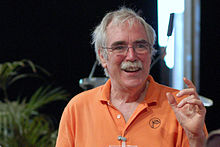Eric F. Wieschaus
Eric Francis Wieschaus | |
|---|---|
 Eric F. Wieschaus in 2011 | |
| Born | June 8, 1947 |
| Nationality | American |
| Alma mater | University of Notre Dame(B.S.) Yale University(Ph.D.) |
| Known for | Embryogenesis |
| Awards | Genetics Society of America Medal(1995) Nobel Prize in Physiology or Medicine(1995) |
| Scientific career | |
| Fields | Developmental biology |
| Institutions | Princeton University Robert Wood Johnson Medical School |
Eric Francis Wieschaus(born June 8, 1947 inSouth Bend, Indiana) is an Americanevolutionary developmental biologistand 1995 Nobel Prize-winner.
Early life[edit]
Born inSouth Bend, Indiana,he attendedJohn Carroll Catholic High SchoolinBirmingham, Alabamabefore attending theUniversity of Notre Damefor his undergraduate studies (B.S., biology), andYale University(Ph.D., biology) for his graduate work.
Scientific career[edit]

In 1978, he moved to his first independent job, at theEuropean Molecular Biology LaboratoryinHeidelberg,Germanyand moved from Heidelberg toPrinceton Universityin theUnited Statesin 1981.[1][2]
Much of his research has focused onembryogenesisin the fruit flyDrosophila melanogaster,specifically in the patterning that occurs in the earlyDrosophilaembryo. Most of the gene products used by the embryo at these stages are already present in the unfertilized egg and were produced by maternal transcription duringoogenesis.A small number of gene products, however, are supplied by transcription in the embryo itself. He has focused on these"zygotically"active genes because he believes the temporal and spatial pattern of their transcription may provide the triggers controlling the normal sequence of embryonic development. Saturation of all the possible mutations on each chromosome by random events to test embryonic lethality was done by Eric Wieschaus.[3]This body of science eventually was termed theHeidelberg screen.[2][4]
In 1995, he was awarded theNobel Prize in Physiology or MedicinewithEdward B. LewisandChristiane Nüsslein-Volhardas co-recipients, for their work revealing the genetic control of embryonic development.[5][6][7][8]
As of 2018, Wieschaus is theSquibb ProfessorinMolecular Biologyat Princeton.[9]He was formerly Adjunct Professor of Biochemistry at theUniversity of Medicine and Dentistry of New Jersey–Robert Wood Johnson Medical School.
Personal life[edit]
He has three daughters and is married to molecular biologistGertrud Schüpbach,who is also a professor ofMolecular BiologyatPrinceton University,working onDrosophilaoogenesis.[citation needed]
Wieschaus is an atheist and is one of the 77 Nobel Laureates who signed the 2007 petition to repeal theLouisiana Science Education Act.[10][11]
Awards and honors[edit]
- Member of theAmerican Academy of Arts and Sciences,elected 1993[12]
- Member of theNational Academy of Sciences,elected 1994[13]
- Nobel Prize in Physiology or Medicine,1995
- Member of theAmerican Philosophical Society,elected 1998[14]
- Mendel Medal of theGenetics Society,1999[15]
References[edit]
- ^Eric F. Wieschauson Nobelprize.org
- ^abWieschaus, E.; Nüsslein-Volhard, C. (2016)."The Heidelberg Screen for Pattern Mutants of Drosophila: A Personal Account".Annual Review of Cell and Developmental Biology.32:1–46.doi:10.1146/annurev-cellbio-113015-023138.PMID27501451.
- ^Connor, S. (1995), "Nobel prize given for work on fruit flies",BMJ,vol. 311, no. 7012 (published October 21, 1995), p. 1044,doi:10.1136/bmj.311.7012.1044,PMC2551360,PMID7580653
- ^St Johnston, D. (2002). "The art and design of genetic screens: Drosophila melanogaster".Nature Reviews. Genetics.3(3): 176–88.doi:10.1038/nrg751.PMID11972155.S2CID6093235.
- ^Gruenbaum, J. (1996), "[Nobel prize winners in medicine—1995]",Harefuah,vol. 130, no. 11 (published June 2, 1996), pp. 746–748,PMID8794677
- ^Blum, H. E. (1995), "[The 1995 Nobel Prize for medicine]",Dtsch. Med. Wochenschr.,vol. 120, no. 51–52 (published December 22, 1995), pp. 1797–800,doi:10.1055/s-0029-1234219,PMID8549267,S2CID260117108
- ^Molven, A. (1995), "1995 Nobel Prize in physiology and medicine. The mystery of fetal development",Tidsskr. Nor. Laegeforen.,vol. 115, no. 30 (published December 10, 1995), pp. 3712–3,PMID8539733
- ^Cohen, B. (1995), "Nobel committee rewards pioneers of development studies in fruitflies",Nature,vol. 377, no. 6549 (published October 12, 1995), p. 465,Bibcode:1995Natur.377..465C,doi:10.1038/377465a0,PMID7566128
- ^"Eric Wieschaus | Squibb Professor in Molecular Biology".Princeton University.RetrievedMay 8,2018.
- ^Lau, Tatiana (April 17, 2007)."Nobel-winning professor tells story of his own life in religion, science".The Daily Princetonian.Archived fromthe originalon August 21, 2016.
- ^"77 Nobel Laureates Call for a Repeal of the LSEA | Repealing the Louisiana Science Education Act".Archived fromthe originalon May 28, 2016.RetrievedAugust 7,2016.
- ^"Eric F. Wieschaus".American Academy of Arts & Sciences.RetrievedMay 16,2020.
- ^"Eric Wieschaus".nasonline.org.RetrievedMay 16,2020.
- ^"APS Member History".search.amphilsoc.org.RetrievedMay 16,2020.
- ^"Mendel Medal".Genetics Society.RetrievedMay 16,2020.
External links[edit]
- Eric Wieschaus's Short Talk: "Finding Genes that Control Development"
- Eric F. Wieschauson Nobelprize.orgincluding the Nobel Lecture on December 8, 1995From Molecular Patterns to Morphogenesis: The Lessons from Drosophila
- American Society for Cell Biology,excellent profile
- The Wieschaus lab
- A Conversation with Eric F. Wieschaus
- 1947 births
- Living people
- American geneticists
- American Nobel laureates
- American atheists
- Members of the European Molecular Biology Organization
- Notre Dame College of Arts and Letters alumni
- Yale Graduate School of Arts and Sciences alumni
- Nobel laureates in Physiology or Medicine
- Members of the United States National Academy of Sciences
- Recipients of the Pour le Mérite (civil class)
- Duke University faculty
- Princeton University faculty
- People from South Bend, Indiana
- Howard Hughes Medical Investigators
